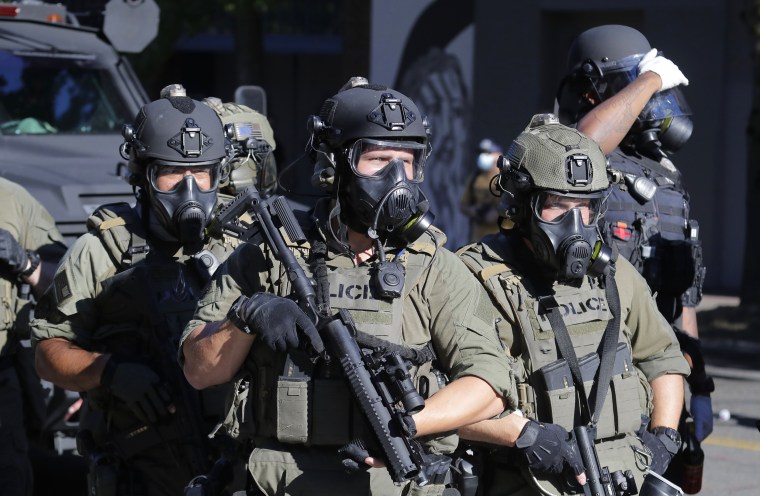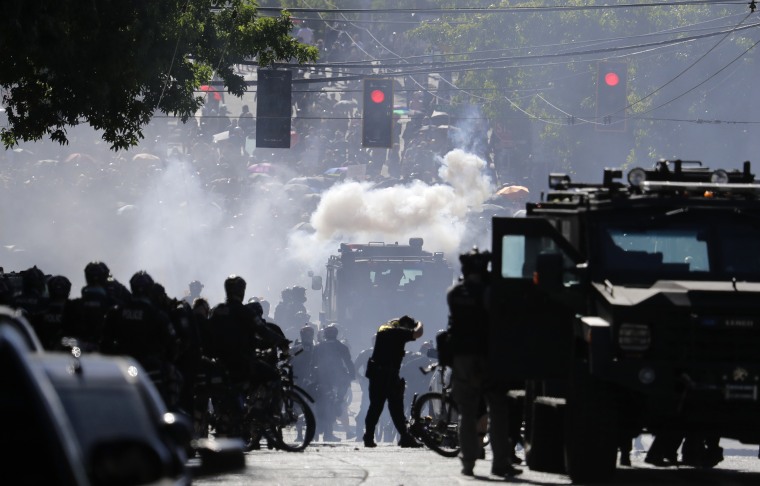A federal judge has held the Seattle Police Department and the city of Seattle in contempt of court for failing to end the “indiscriminate” use of projectile weapons and chemical irritants on crowds during Black Lives Matter protests.
Judge Richard Jones of the Western District of Washington said Seattle police made four “clear violations” of a previous court order, which prohibited police use of “less-lethal” weapons on peaceful protesters.
In a 27-page court filing Monday, Jones named pepper spray, pepper balls, blast balls and paintballs as less-lethal weapons, or weapons less likely to cause fatalities when used.
Jones said Seattle police failed to justify their use, specifically blast balls, during four different protests in August and September.
“Yesterday’s decision to hold the Seattle Police Department in contempt affirmed evidence of SPD failing to uphold its responsibilities,” Black Lives Matter of Seattle-King County said in a statement Tuesday. “Clearly, accountability will only come when the people demand it—in the courts, on the ballot, and in the streets. We have and will continue to do so.”
The Seattle Police Department did not immediately respond to request for comment Wednesday afternoon.

The ruling came in response to a recent motion by Black Lives Matter of Seattle-King County alleging police acted beyond what the court previously defined as “necessary” and “reasonable” in responding to threats of harm during protests.
Jones also cited four instances in which Seattle police complied with the court-ordered injunction, which arose amid SPD’s controversial use of crowd-control weapons during early protests over the death of George Floyd, the unarmed black man killed in Minneapolis police custody in May.
“Compared to its uses of less lethal weapons earlier this year when this action was first brought, SPD’s uses at these four protests appear to be more restrained. Deployments generally appear to be more targeted and proportional than before,” Jones wrote.
However, of the four violations, the court was “most concerned” with police misuse of blast balls, from which three of the violations occur. Blast balls, a grenade-like weapon that spews pepper gas when detonated, were used with little accuracy, Jones said.
“In many cases, the accuracy of these baseball-style throws is suspect,” Jones wrote. “And when blast balls explode, they explode in all directions and kick OC powder (pepper spray powder) in the air.”
On at least two separate occasions, Seattle police threw blast balls indiscriminately into crowds, according to the filing, which examined scores of evidence, including video and police reports.
During a Sept. 7 protest, police deployed blast balls into a crowd after a protester hurled a glass object at officers’ feet, according to the filing. Without knowing for certain who threw it, police deployed blast balls into different areas of the crowd, an offense that “was not sufficiently targeted to nullify a threat.”
Weeks later, during a Sept. 23, protest an officer deployed a blast ball from behind a row of other officers and immediately turned around to retrieve his bicycle, which displayed "a clear lack of care for where the blast ball landed," Jones said.
Download the NBC News app for breaking news and politics
While the previous court order allows officers to use less-lethal weapons in certain limited circumstances when there are threats of physical harm, violence or property destruction, officers cannot do so in such an indiscriminate manner, in which officers “stood a great distance from protestors, used overhand throws, and threw blast balls deep into a crowd.”
“Here, blast ball uses could have been justified as a response to a specific imminent threat,” Jones wrote. “But even if they were justified, they were plain violations of the command that less lethal weapons should not be deployed indiscriminately into a crowd.”
Another incident, one concerning the use of pepper spray, occurred during the Sept. 7 protest when an officer on a bicycle rode up behind several retreating protesters, and “for no apparent reason,” pepper sprayed them, an action Jones said does not comply with the order’s requirement that use of such a weapon must be “necessary, reasonable, proportional, and targeted.”
Jones said the four violations are more than mere technicalities, and appropriate sanctions will be decided for the civil contempt.
